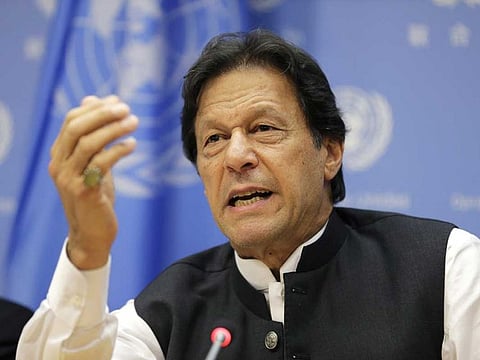Imran should focus on improving lives of ordinary Pakistanis
Pakistan PM should focus on rebuilding key institutions that have been eroded over time

Prime Minister Imran Khan’s promise last week to lead Pakistan towards greater digitalisation marks yet another beginning with little relevance to the country’s mainstream households.
It follows a spate of official claims highlighting the success of Imran’s government in turning around the economy. In the past, such disconnects between reality and expectations were seen akin to the proverbial glass being half full or half empty. But given the slide surrounding Pakistan, it’s hard to find a similar analogy.
The digitalisation drive, though commendable, hardly promises to tackle compelling questions over the present state and future direction of the country. In a year when inflation has hit a record high, agricultural incomes in many areas have either fully or partially collapsed. Businesses are feeling the heat as they cope with record-high bank interest rates. Evidence of a slowdown is visible all around. Taken together, the claims versus real-life evidence must qualify among the worst disconnects in the history of Pakistan.
Stabilisation of the economies of Pakistan’s average household through the creation of badly needed jobs appears to be a distant prospect.Farhan Bokhari, Pakistan commentator
In the past year, much has gone wrong for the average Pakistani. Across the country, mounting inflation has rapidly outpaced household incomes. Irrespective of where Pakistan’s economic growth numbers will end in the financial year to June 2020, it’s clear that the growth cycle is roughly keeping pace with population growth.
Across the rural heartland, the cotton crop once known as the ‘queen’ of Pakistan’s agricultural sector, has crashed this year. Other crops have also recorded unimpressive gains except for the official policy backing for sugar cane that translates into sugar production, controlled by a politically powerful ring of interest groups. Consequently, anecdotal evidence from villages across the country shows a tight crunch surrounding rural households where incomes have lagged significantly behind needs.
To make matters worse, the government has raised the official price paid to farmers for wheat sold to the government by a meagre five per cent in a year when inflation has risen over 12 per cent. This appears to be driven by concerns over keeping next years’ price of flour under “control”. Clearly, there has been an utter failure to consider the plight of the farming community.
A major success in battle against corruption
Across urban Pakistan, the picture is hardly different. Businesses and industries are under pressure from a record rise in interest rates that have swelled to over 13 per cent, making any expansion a challenge. Large scale robust expansion or new ventures appears only on official papers with little evidence of any activity on the ground. Ultimately, stabilisation of the economies of Pakistan’s average household through the creation of badly needed jobs appears to be a distant prospect.
Meanwhile, Imran’s government scored a major success in its battle against corruption. An announcement from the UK said that at least £190 million (Dh916 million) belonging to property tycoon Malik Riaz was tracked in the UK and subsequently transferred back to Pakistan. It finally established a long-awaited precedent. The funds were illicitly taken out of Pakistan in a long and dodgy money trail that highlighted the way the country has become tolerant of corruption.
Also Read: Pakistan’s ruling structure needs to refocus
But this rare incident is not proof enough that the powerful reality of graft in everyday life has begun to recede. Though the main anti-corruption watchdog, the national accountability bureau or NAB, claims to be leading an aggressive campaign against corruption, its work is still in progress. Opposition politicians have claimed that the NAB is being used by Imran and his Pakistan Tehreek-e-Insaf, or PTI political party, for targeting the government’s political foes. The bureau has yet to establish itself as a platform for providing relief to ordinary Pakistanis who are faced with graft in their daily lives. From people using the services of their local municipalities to others seeking jobs in the public sector, stories of greasing palms are all around.
Ultimately, people’s future will improve only if the country’s rulers focus on rebuilding key institutions that have been eroded over time. While Imran’s compulsions may force him or his cabinet colleagues to exploit every opportunity to impress the public, the reality is far more complex. Unless the government reforms the key institutions, the successful repatriation of £190 million will remain isolated incidents. It’s about time that Imran receives a long-overdue reality check to steer Pakistan out of its multiple challenges.
While Imran pushed for greater digitalisation to help Pakistanis with platforms for enhancing their knowledge, his government faced a dilemma: A population with greater knowledge would press for its rights.
— Farhan Bokhari is a Pakistan-based commentator who writes on political and economic matters.
Sign up for the Daily Briefing
Get the latest news and updates straight to your inbox



